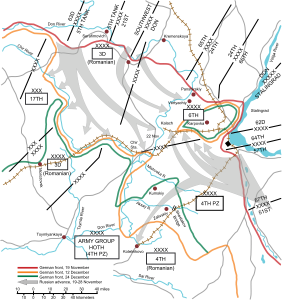
On November 19, 1942, Operation Uranus began under the generalship of Georgy Zhukov during the Battle of Stalingrad (Episode 83). It marked the turning point in the Great Patriotic War (World War II) where the Nazi’s began their torturous retreat back to Germany at the cost of millions of lives.
The Battle of Stalingrad was a fierce battle that began on August 23, 1942 and ended on February 2, 1943 with the destruction and surrender of the Wehrmacht Army Group Southled by Fredrick Paulus. The battle was one of the costliest in terms of life in human history with an estimated 750,000 German and allied troops being killed, wounded or captured and 1.1 million Soviet soldiers and citizens being killed or wounded.
The Soviet strategy once the Germans entered the city of Stalingrad was to “hug” their enemies by staying in as close of a proximity to them as was possible. This negated the superior German firepower, especially their air support and artillery. Despite these tactics, the Luftwaffe conducted thousands and thousands of sorties which caused massive destruction to the city and a great loss of life on both sides.
Three months into the fighting the Germans had occupied 90% of Stalingrad but could go no further. The rallying cry of the Soviet Red Army was “Not a Step Back!” and “There is No Land Behind the Volga!” Stalin had already sent out orders that anyone who retreated would be shot along with their entire family back home. The incentive to fight to the death was great on both sides.
Slowly but surely, the Red Army began to encircle the embattled German forces in the city which slowed then stopped supplies from reaching the now desperate men. With fall, then winter approaching, the Soviet military command knew that it was only a matter of time before they would emerge victorious. It was then on November 19th, that Operation Uranus began with flanking maneuvers and a over 18 battalions and numerous tank and motorized brigades began the attack.
2 replies on “Stalingrad Counterattack – Operation Uranus”
I think one of the most interesting, but often missed, aspects of the story of the Battle of Stalingrad is that it was the battle that pitted the German concept of the war in the East against the Russian one.
That is, the Germans seem to have genuinely believed that reaching the Volga meant that they had achieved their war aims. On the SMH forum, http://www.militaryhorse.org I posted, quite some time ago, a post war analysis of German cavalry which noted, amongst other things, that the SS actually conceived of the Soviet frontier as something that they could expand into, sort of US 19th Century Western frontier style, in order to blood its troops from time to time, which by extension seems to suggest that upon reaching the Volga, they thought they were done. Additionally, comments by Hitler seem to suggest the same thing. They slowed, in part, once they’d reached the Volga as they couldn’t really grasp the war continuing beyond that point.
The Russians, the defending party, of course had no such concept.
That’s where the real analogy with the Napoleonic Wars comes in. Napoleon was defeated not solely because of General Winter, but rather because the type of war he was familiar with held that once you captured an enemy’s capitol, the enemy was defeated. The Russians apparently didn’t grasp that. When, to his shock, Napoleon realized that isn’t the view the Russians held he tried to advance beyond Moscow but it was too late in the year, and he therefore had no choice but to depart. By the same token, once the Germans realized that the Soviets didn’t view the war as over, and as the Germans were subject to Nazi ideology which prevented them from viewing the Russians as anything more than slaves, at best, it was far too late for them to really do much to save themselves.
I understand why some may think that the enemy is defeated once the capital has been captured, being where the government resides, but it depends on the degree of centralism in the country. Furthermore, a government can set up a temporary site elsewhere and it is clearly evident that a country can continue to resist its attackers in countries such as Australia, where the largest city is not the capital (the capital is Canberra, not Sydney).